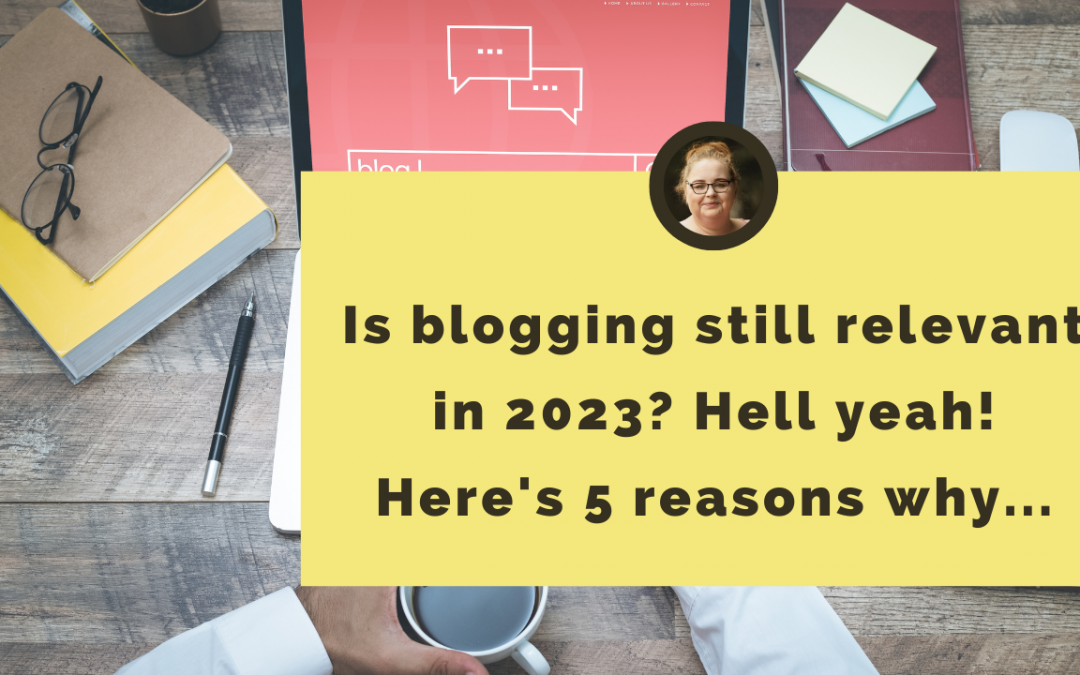As a small business owner or entrepreneur, you may be wondering if blogging is still a relevant marketing tool in 2023.
With so many changes in technology and society over the past few years, it’s understandable to question whether or not something like blogging is still an effective marketing strategy.
The simple answer is yes! Blogging can be an extremely powerful marketing tool when used correctly. In this guide, I’ll share my top five reasons why blogging is still a relevant and effective marketing strategy in 2023.
Why you should start blogging today
Build Presence and Authority
Blogging is a powerful tool for building presence and authority in your industry. By consistently creating valuable content that answers common questions and provides reliable information, you establish yourself as an expert and gain the trust of your audience. This trust can increase conversions and sales, as customers are more likely to do business with brands they trust. Here’s what research conducted by Hubspot recently found:
“Our research suggested that most consumers read blogs multiple times per week and have purchased something from a brand after reading the company’s blog.”
Let’s look at an example from one of my clients; a Mental Health Training Business fills its blog with informative posts about managing mental health in the workplace, how employers can support their employees, and the latest industry research, showcasing its expertise and building loyalty with its audience. Additionally, they use blog posts to answer specific questions and position themselves as helpful resources to prospects, further building trust.
By putting out valuable content consistently and following the E-A-T concept of expertise, authoritativeness, and trustworthiness, blogging can help you establish yourself as a leader in your industry.
Improve Search Engine Optimisation (SEO)
Like with blogging, many people still question whether SEO is still relevant in 2023 (I’ll be covering that soon), but again the simple answer is yes.
It’s more important than ever that potential clients can find your business online, and blogging is an effective way to improve your website’s SEO. By regularly creating keyword-rich blog articles that are optimised for search engines such as Google, your website can rank higher in organic search results, resulting in more traffic and leads.
As another example, one of my clients is a Talent Consultant, helping businesses recruit diverse and innovative teams. Their most recent blog is currently sitting at Number 2 on Google Search Results for an article discussing ageism in the workplace, a trending topic in the HR space right now.
Consistent blogging also keeps your website fresh, which search engines favour. By incorporating tactics such as keyword research, link building, optimising headings, titles, and meta descriptions, and adding internal links to each post, you can improve your website’s page authority and rank higher in search results pages (SERPs).
Additionally, blogging about your business, product, or service will naturally increase your search keywords. You can further boost your search keyword rankings by utilising specific keywords about your product or service.
Read More: Getting started with keyword research.
Overall, maintaining a blog can significantly improve a website’s SEO and attract more leads to your business.
Increase Web Traffic and Sales
Blogging is an effective tool for increasing web traffic and conversions. By providing valuable and keyword-rich content related to your audience’s needs and interests, you can attract more visitors to your site. Regularly updating your blog with new products or services and discounts and promotions can also boost your lead generation strategy. Each blog post is a new opportunity to generate leads and convert website traffic into paying customers. By including lead-generating call-to-actions in each post, such as free ebooks or webinars, visitors can exchange their contact information for valuable content assets. Remember, not all blog readers will become leads. Still, the more frequently you post quality content, the more opportunity you have for higher traffic and conversions. So get blogging, put calls to action on every post, and strive to improve your visitor-to-lead conversion rate each month.
Develop Customer Relationships
Blogging is an excellent way for you to build stronger relationships with your customers:
- By blogging, you provide valuable information to your customers that can help them make informed buying decisions. This helps establish trust and credibility with the audience, which is essential for building lasting relationships.
- Blogging allows you to engage in meaningful conversations with your target audience. This can be achieved by posting videos, news, data, and exciting trends related to the industry. And by doing this, you can demonstrate your expertise and build trust with your audience.
- By creating an active comment section below your blogs and responding quickly to your readers, you can develop a sense of belonging and community, further strengthening the relationship with your customers.
In summary, regular blogging can help you foster stronger connections with your audience by providing valuable information, engaging in meaningful conversations, and building trust and credibility.
Make Money
Ok, maybe this should have been Number 1… Blogging has become a popular way for individuals and businesses to earn extra income, and not just by generating leads. You can attract a loyal following by creating valuable content that solves problems or educates readers on topics related to their interests. And there are several ways you can monetise this, including:
- Sponsored posts
- Affiliate marketing
- Selling digital or physical products
For example, one of my clients is an Amazon Affiliate. They have built a popular site dedicated to giving reviews and the latest information on all types of smart tech, with product links in their blogs. If a reader clicks on a product link and goes on to buy that product, my client makes a commission from Amazon.
Now you know precisely why blogging is so powerful; you might have some questions about getting started, so here are the answers to some of the most common questions I hear…
What are the FAQs about blogging?
Do I need to invest money to start a blog?
Starting a blog does not necessarily require a large investment of money. You only need a domain name and web hosting service, which you can get for less than £60 per year. Additionally, web hosting platforms such as Bluehost make it easy to create and manage a WordPress blog without needing any technical knowledge or coding experience. While there may be additional expenses, such as hiring a writer or purchasing premium themes or plugins, these are not necessary for starting a basic blog. But as we’ve seen above, investing in a blog can have numerous benefits for your business.
What kind of content should I write?
To create compelling blog content, it’s essential to understand your audience and create content that is both engaging and valuable.
Read More: Knowing your ideal client is key to creating copy that converts.
This can be achieved by incorporating images, infographics, and videos, and breaking up heavy blocks of text with subheadings. Providing in-depth, well-researched content that explores a topic from multiple angles can also help establish your brand as an authority in your industry.
Experimenting with different types of content, such as listicles, how-to guides, and case studies, can help determine what resonates best with your audience. Ultimately, the key to successful blogging is to focus on quality over quantity and provide content that is both informative and engaging.
How often should I blog?
To maximise the benefits of blogging as a marketing tool, you should aim to post consistently. While there is no one-size-fits-all answer, posting at least once a week is a good starting point. However, it’s important to prioritise quality over quantity.
Rather than posting for the sake of posting, focus on creating high-value content relevant to your target audience. This will help attract and retain readers, establish your brand as a thought leader in your industry, and ultimately drive traffic and conversions to your website.
How long should each post be?
When using a blog post as a marketing tool, it is vital to keep in mind the attention span of readers. Studies show that people tend to read blogs with titles between 6-13 words and prefer shorter sentences and paragraphs. As a rule of thumb, limit each sentence to one thought to make it more digestible.
To keep readers engaged, break up heavy blocks of text with multimedia elements such as images, infographics, tweets, and videos. In terms of length, the ideal range of words for a blog post is between 600-1,600 words. However, longer articles can be broken down into smaller, more readable sections with well-thought-out headers and lists to make it easy for readers to skim through.
How can I increase my blog’s traffic?
To increase your blog’s traffic, there are three key strategies you should focus on:
- Create valuable and shareable content that will attract new visitors and keep them coming back for more.
- Optimise your blog for search engines by using specific keywords and publishing fresh content regularly. This will improve your search engine rankings and make it easier for people to find your blog.
- Promote your blog through social media and other channels to reach a wider audience.
Share your blog posts on social media and include share buttons on your website to encourage readers to spread the word. Following these strategies can increase your blog’s traffic and attract more potential customers.
Conclusion
So there you have it, all the reasons you need to start or reignite your business blog. Not only is it still a powerful marketing tool, but it’s also a great way to connect with your audience and build relationships.
If you’re thinking of starting a blog, be sure to create content that is valuable and relevant to your audience, and if you want expert results, feel free to drop me a message; I’d love to have a chat about how I might be able to help you reach your business goals.
As a content and copywriter, helping businesses attract and nurture their ideal clients to grow their sales is what lights me up. Drop me a message today if you need help identifying your perfect client, messaging, or communicating your offer.
You can also download my FREE guide to make SEO Easy which is a handy desktop guide packed with quick and easy tips to get your business found online.
Or
If you’re stuck with where to start with your social media or blogs, I send a FREE email every Sunday with 7 content ideas for the week ahead to help you get those creative juices flowing. You can sign up here.


Trackbacks/Pingbacks